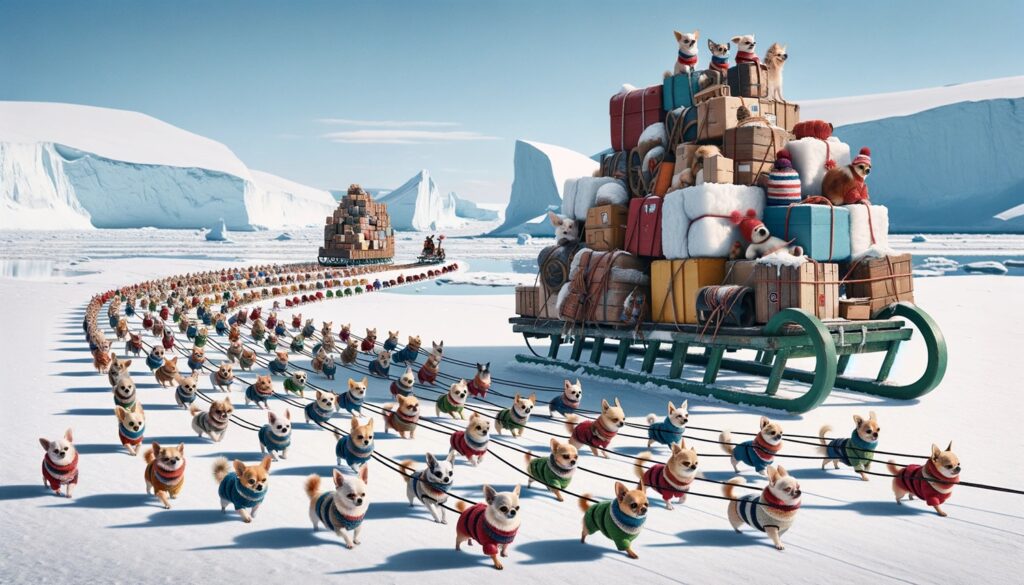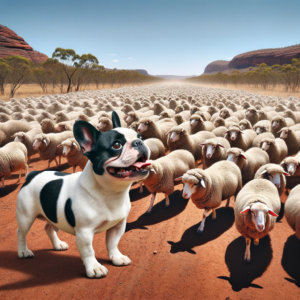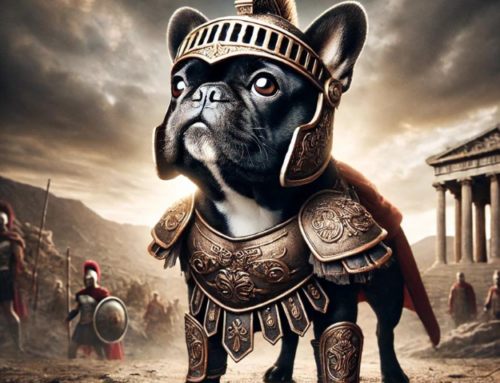The Changing Expectations and Evolution of French Bulldogs
By Lloyd Grosse – November 23
In this essay, I want to examine the evolution of French Bulldogs. However, before delving into Frenchies, it’s worth taking a moment to reflect on dogs in general. Often, we overlook the fact that dogs are a mirror to us humans, coming in all kinds, shapes, personalities, and aptitudes.
In Australia, our lives are enriched by the presence of 6.38 million dogs. (Source: Animal Medicine Australia 2022)
They deliver our slippers, bark at our neighbours, and chew up our furniture. The bond between humans and dogs is deep-seated and complex. While the reasons dogs have become such a vital part of our humanity are contested, it’s widely recognised that we have evolved together. Dogs have even learned to mimic the face of a baby as well as retaining their puppy characteristics well into adulthood, which is designed to trigger parental feelings in us. Biological evolutionists even have names for it – paedomorphosis or neoteny – and it is most prevalent in domesticated animals.
 My favourite theory posits that dogs ingratiated themselves into our lives over several millennia, likely before we were fully domesticated. They began as cleaners, eating scraps of food and keeping vermin at bay. But then, something extraordinary happened. Their advanced senses, far superior to ours, became an asset we couldn’t ignore. Over time, we effectively subcontracted our fine senses of smell and hearing to dogs. This symbiotic relationship may have given dog-loving humans an evolutionary edge.
My favourite theory posits that dogs ingratiated themselves into our lives over several millennia, likely before we were fully domesticated. They began as cleaners, eating scraps of food and keeping vermin at bay. But then, something extraordinary happened. Their advanced senses, far superior to ours, became an asset we couldn’t ignore. Over time, we effectively subcontracted our fine senses of smell and hearing to dogs. This symbiotic relationship may have given dog-loving humans an evolutionary edge.
Indeed, a bone unearthed in 1977 in a cave in Erralla, Spain, believed to be Europe’s oldest remains of a domesticated dog, dates back 17,000 years. This discovery, made in the Basque Country, was only recently confirmed as a domestic dog through advanced genetic technology.
You can read more about this fascinating find here.
By outsourcing our sensory tasks to dogs, our brains were freed up to evolve higher forms of thinking. In a way, dogs could be credited with aiding in our journey towards civilisation.
We’ve used this evolutionary process to transform the wild wolf, the common ancestor of all dogs, into a myriad of breeds, each with unique traits and characteristics. These breeds are now so diverse that they can range from a dignified Husky to a small, pampered pooch sitting on a lounge in a pink tutu, wearing a nutty hat and glasses.

LOOK, there’s a reason Chihuahuas aren’t strapped to snow sledges
and made to cart loads around the Arctic
Similarly, you won’t find French Bulldogs herding sheep in the Australian outback or leading the visually impaired through bustling city streets. Each dog breed, shaped by centuries of selective breeding, embodies a unique set of traits and characteristics – a legacy that reflects both human ingenuity and nature’s design.
Among these diverse breeds, the French Bulldog stands out with its distinct history and unmistakable charm. Originally bred as companions for Parisian seamstresses and later, the demimonde of 19th century France, these dogs were sculpted for life in the urban milieu, not for the rugged outdoors or high-energy tasks. Their iconic bat-like ears, short snouts, and stocky frames are products of careful breeding, tailored to suit the laps and living quarters of their owners, rather than the vast, open fields or challenging terrains.
This breed-specific design process isn’t unique to French Bulldogs. Take the bloodhound, for instance, renowned for its unparalleled sense of smell, making it an invaluable asset in law enforcement. Or consider the Beagle, with its keen nose routinely employed in airport security to sniff out contraband. Herding breeds like Kelpies and Border Collies display boundless energy and remarkable intelligence, making them indispensable in managing livestock.
However, turning our focus back to French Bulldogs, these dogs, with their playful demeanour and affectionate nature, are better suited to a life of leisure and companionship. They find joy in the comfort of a cosy home, thriving on soft beds, gentle pats, and leisurely play sessions.
Despite their origins as companions for urban living, French Bulldogs have proven to be more than just charming lap dogs. Their intuitive nature and deep bond with humans have revealed another remarkable aspect of their evolution – their potential as assistance dogs. Frenchies, with their attentive and affectionate demeanour, have shown incredible aptitude in providing emotional support and companionship to those in need. Their small size makes them ideal for indoor environments, and their empathetic nature allows them to connect deeply with their owners, offering comfort and a sense of security.
This emerging role as assistance dogs is a testament to their adaptability and the profound connection they share with humans. It’s a role that not only highlights their versatility but also underscores the importance of responsible breeding practices that focus on temperament and health, ensuring these dogs can effectively fulfill such vital roles in people’s lives.
In the face of Australia’s unique climate and lifestyle challenges, the role of dedicated responsible Australian French Bulldog breeders (who form only 7.8% of breeders in NSW*) becomes paramount. Our breeders are working hard to adapt these quintessentially European dogs to our climate. A challenge all breeders will be faced with as climate change continues to warm the planet – in fact, the reality of a hot world is that every living thing will be challenged to breathe. In essence, Frenchie breeders are pioneers, leading the way with innovative and proactive approaches to adapting to our climate. How any of us will cope with the new heatwave conditions where whole weeks can top 40°c is anyone’s guess. But just as no one in their right minds would send their kids off to the local basketball hoop on a 47°c day – how anyone could expect French Bulldogs, no matter how well adapted they become to be active when days are hot is completely bewildering. NSW breeders are adopting advanced tests to assess breathing endurance, essential for the breed’s well-being, and while we are setting new standards in our breed’s capacity to cope with our climate – it seems the climate continues to set new goals for every living thing every day.

While bacteria and fungi will probably flourish, mammals will at some stage exceed our capacity to expect natural selection or even active breeding science to evolve us to cope with a new hotter Earth. That hasn’t stopped Frenchie breeders from doing as much as is possible to evolve our Brachycephalic dog’s ability to cope. But it needs a deep understanding and commitment to the breed’s future in Australia. Responsible breeding, in this context, is not just a practice but a mission: to harmoniously blend the French Bulldog’s charming characteristics with the demands of the Australian environment. It’s a testament to our breeders’ dedication that French Bulldogs continue to be beloved and thriving companions down under.
Respecting the history and characteristics of each breed is crucial in the world of purebred dogs. Every breed is akin to a living, breathing work of art, embodying years of history, cultural significance, and the specific human needs that led to its creation. Maintaining these breeds involves not only preserving their unique traits but also allowing for their healthy evolution. Kennel club breed standards serve as vital guidelines in this process, ensuring that the essential characteristics of each breed are retained, while also embracing the gradual evolution towards healthier, more resilient specimens. This delicate balance of honouring historical attributes and adapting to necessary changes is key to the well-being and adaptability of these breeds.
In Australia, this responsibility is particularly poignant for French Bulldog breeders, who are tasked with preserving the breed’s core qualities while enhancing their health and suitability for our environment. This task requires an in-depth understanding of the breed’s genetic lines and a strong ethical commitment to its future. Both breeders and prospective owners share the duty to uphold breed standards and support ethical breeding practices that prioritise health and adaptability. By doing so, we not only maintain the distinct traits of the French Bulldog but also contribute to the time-honoured tradition of selective breeding. This tradition, which adapts to changing human environments and needs, ensures the thriving of these canine companions for generations. In safeguarding the integrity of pure breeds like the French Bulldog, we preserve a vital piece of history and human culture, ensuring the continuation of a legacy that has evolved over millennia. Our commitment is to both the past and the future, ensuring that the cherished traits of these breeds endure as they adapt to new challenges and environments.
This Essay was written by Lloyd Grosse for the French Bulldog Club of NSW eNews December 2023.
Ethical Use of AI Disclosure: We are committed to the highest ethical standards when working with AI. This disclosure forms part of our commitment to transparency. This essay has been assisted by OpenAI’s ChatGPT 4. AI has been used to polish and proof-read the draft. The ideas, concepts and thoughts that form the basis of the Essay are entirely those of the Author. All the images used in this Essay were created as a collaboration between the author and Chat GPT’s DALL-E. The collaboration logs have been archived and are available for review.
Unique by Design – The Changing Expectations and Evolution of French Bulldogs by Lloyd Grosse is licensed under Creative Commons Attribution-ShareAlike 4.0 International









